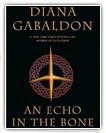Outlander aka Cross Stitch - Gabaldon Diana (библиотека электронных книг txt) 📗
Marrying. Oh, God. Buoyed temporarily by port wine and cream lace, I had momentarily managed to ignore the significance of the occasion. I gripped the banister as fresh realization hit like a blow in the stomach.
Looking over the throng, though, I noticed one glaring omission. My groom was nowhere in sight. Heartened by the thought that he might have succeeded in escaping out of a window, and be miles away by now, I accepted a parting cup of wine from the innkeeper before following Dougal outside.
Ned and Rupert went to fetch the horses. Murtagh had disappeared somewhere, perhaps to search for traces of Jamie.
Dougal held me by one arm; ostensibly to support me lest I stumble in my satin slippers, in reality to prevent any last-minute breaks for freedom.
It was a “warm” Scottish day, meaning that the mist wasn’t quite heavy enough to qualify as a drizzle, but not far off, either. Suddenly the inn door opened, and the sun came out, in the person of James. If I was a radiant bride, the groom was positively resplendent. My mouth fell open and stayed that way.
A Highlander in full regalia is an impressive sight – any Highlander, no matter how old, ill-favored, or crabbed in appearance. A tall, straight-bodied, and by no means ill-favored young Highlander at close range is breath-taking.
The thick red-gold hair had been brushed to a smooth gleam that swept the collar of a fine lawn shirt with tucked front, belled sleeves, and lace-trimmed wrist frills that matched the cascade of the starched jabot at the throat, decorated with a ruby stickpin.
His tartan was a brilliant crimson and black that blazed among the more sedate MacKenzies in their green and white. The flaming wool, fastened by a circular silver brooch, fell from his right shoulder in a graceful drape, caught by a silver-studded sword belt before continuing its sweep past neat calves clothed in woolen hose and stopping just short of the silver-buckled black leather boots. Sword, dirk, and badger-skin sporran completed the ensemble.
Well over six feet tall, broad in proportion, and striking of feature, he was a far cry from the grubby horse-handler I was accustomed to – and he knew it. Making a leg in courtly fashion, he swept me a bow of impeccable grace, murmuring “Your servant, Ma’am,” eyes glinting with mischief.
“Oh,” I said faintly.
I had seldom seen the taciturn Dougal at a loss for words before. Thick brows knotted over a suffused face, he seemed in his way as taken aback by this apparition as I was.
“Are ye mad, man?” he said at last. “What if someone’s to see ye!”
Jamie cocked a sardonic eyebrow at the older man. “Why, uncle,” he said. “Insults? And on my wedding day too. You wouldna have me shame my wife, now, would ye? Besides,” he added, with a malicious gleam, “I hardly think it would be legal, did I not marry in my own name. And you do want it legal, now, don’t you?”
With an apparent effort, Dougal recovered his self-possession. “If ye’re quite finished, Jamie, we’ll get on wi’ it,” he said.
But Jamie was not quite finished, it seemed. Ignoring Dougal’s fuming, he drew a short string of white beads from his sporran. He stepped forward and fastened the necklace around my neck. Looking down, I could see it was a string of small baroque pearls, those irregularly shaped productions of freshwater mussels, interspersed with tiny pierced-work gold roundels. Smaller pearls dangled from the gold beads.
“They’re only Scotch pearls,” he said, apologetically, “but they look bonny on you.” His fingers lingered a moment on my neck.
“Those were your mother’s pearls!” said Dougal, glowering at the necklace.
“Aye,” said Jamie calmly, “and now they’re my wife’s. Shall we go?”
Wherever we were going, it was some distance from the village. We made a rather morose wedding party, the bridal pair encircled by the others like convicts being escorted toward some distant prison. The only conversation was a muted apology from Jamie for being late, explaining that there had been some difficulty in finding a clean shirt and coat large enough to fit him.
“I think this one belongs to the local squire’s son,” he said, flipping the lacy jabot. “Bit of a dandy, it looks like.”
We dismounted and left the horses at the foot of a small hill. A footpath led upward through the heather.
“Ye’ve made the arrangements?” I heard Dougal say in an undertone to Rupert, as they tethered the beasts.
“Och, aye.” There was a flash of teeth in the black beard. “Was a bit o’ trouble to, persuade the padre, but we showed him the special license.” He patted his sporran, which clinked musically, giving me some idea of the nature of the special license.
Through the drizzle and mist, I saw the chapel jutting out of the heather. With a sense of complete disbelief, I saw the round-shouldered roof and the odd little many-paned windows, which I had last seen on the bright sunny morning of my marriage to Frank Randall.
“No!” I exclaimed. “Not here! I can’t!”
“Hst, now, hst. Dinna worry, lass, dinna worry. It will be all right.” Dougal put a large paw on my shoulder, making soothing Scottish noises, as if I were a skittish horse. “ ’Tis natural to be a bit nervous,” he said, to all of us. A firm hand in the small of my back urged me on up the path. My shoes sank moistly in the damp layer of fallen leaves.
Jamie and Dougal walked close on either side of me, preventing escape. Their looming plaid presences were unnerving, and I felt a mounting sense of hysteria. Two hundred years ahead, more or less, I had been married in this chapel, charmed then by its ancient picturesqueness. The chapel now was creaking with newness, its boards not yet settled into charm, and I was about to marry a twenty-three-year-old Scottish Catholic virgin with a price on his head, whose-
I turned to Jamie in sudden panic. “I can’t marry you! I don’t even know your last name!”
He looked down at me and cocked a ruddy eyebrow. “Oh. It’s Fraser. James Alexander Malcolm MacKenzie Fraser.” He pronounced it formally, each name slow and distinct.
Completely flustered, I said “Claire Elizabeth Beauchamp,” and stuck out my hand idiotically. Apparently taking this as a plea for support, he took the hand and tucked it firmly into the crook of his elbow. Thus inescapably pinioned, I squelched up the path to my wedding.
Rupert and Murtagh were waiting for us in the chapel, keeping guard over a captive cleric, a spindly young priest with a red nose and a justifiably terrified expression. Rupert was idly slicing a willow twig with a large knife, and while he had laid aside his horn-handled pistols on entering the church, they remained in easy reach on the rim of the baptismal font.
The other men also disarmed, as was suitable in the house of God, leaving an impressively bristling pile of lethality in the back pew. Only Jamie kept his dagger and sword, presumably as a ceremonial part of his dress.
We knelt before the wooden altar, Murtagh and Dougal took their places as witnesses, and the ceremony began.
The form of the Catholic marriage service has not changed appreciably in several hundred years, and the words linking me with the red-headed young stranger at my side were much the same as those that had consecrated my wedding to Frank. I felt like a cold, hollow shell. The young priest’s stammering words echoed somewhere in the empty pit of my stomach.
I stood automatically when it came time for the vows, watching in a sort of numbed fascination as my chilly fingers disappeared into my bridegroom’s substantial grasp. His fingers were as cold as my own, and it occurred to me for the first time that despite his outwardly cool demeanor, he might be as nervous as I was.
I had so far avoided looking at him, but now glanced up to find him staring down at me. His face was white and carefully expressionless; he looked as he had when I dressed the wound in his shoulder. I tried to smile at him, but the corners of my mouth wobbled precariously. The pressure of his fingers on mine increased. I had the impression that we were holding each other up; if either of us let go or looked away, we would both fall down. Oddly, the feeling was mildly reassuring. Whatever we were in for, at least there were two of us.



